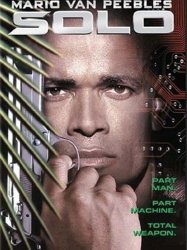Films from the country "mexique", sorted by revenue

Babel (2006)
, 2h23Directed by Alejandro González Iñárritu
Origin Mexique
Genres Drama
Themes Films set in Africa, Medical-themed films, Seafaring films, Transport films, Films about disabilities, Le désert, Personne sourde ou muette, Sign-language films, Films about language and translation
Actors Brad Pitt, Cate Blanchett, Gael García Bernal, Adriana Barraza, Peter Wight, Rinko Kikuchi
Babel focuses on four interrelated sets of situations and characters, and many events are revealed out of sequence. The following plot summary has been simplified and thus does not reflect the exact sequence of the events on screen.

Instructions Not Included (2013)
, 2h2Directed by Eugenio Derbez
Origin Mexique
Genres Drama, Comedy
Actors Alessandra Rosaldo, Eugenio Derbez, Arcelia Ramírez, Hugo Stiglitz, Arap Bethke, Karla Souza
Valentín Bravo had been always a rather fearful child, afraid of everything from heights to spiders. His father, Juan "Johnny" Bravo, raised him trying to make him fearless by making a tarantula walk on Valentin and throwing him off a high oceanside cliff known as La Quebrada. When his father locked Valentín in a crypt at a cemetery, Valentín began to resent his father and ran away after stating that he no longer loves him.

Y Tu Mamá También (2001)
, 1h45Directed by Alfonso Cuarón
Origin Mexique
Genres Drama, Romance
Themes Films about sexuality, Transport films, Bisexuality-related films, Erotic films, LGBT-related films, Films about automobiles, Road movies, LGBT-related films, LGBT-related film
Actors Maribel Verdú, Gael García Bernal, Diego Luna, Diana Bracho, Verónica Langer, María Aura
The film uses an omniscient narrator to provide information on the characters and their personal life, historical Mexican events, and the settings depicted in the film. These "footnotes" also reveal the economic and political issues in Mexico, particularly the impoverished lifestyle of people living in rural areas across the country.

The Crime of Padre Amaro (2002)
, 1h58Directed by Carlos Carrera
Origin Mexique
Genres Drama, Romance
Themes Pregnancy films, Films about religion, Films about sexuality
Actors Gael García Bernal, Ana Claudia Talancón, Ana Claudia Talancón, Sancho Gracia, Angélica Aragón, Ernesto Gómez Cruz
Newly ordained Padre Amaro arrives in Los Reyes, a small town in the fictional state of Aldama, to start his life serving the church. He is a protégé of a ruthless political bishop, while the local priest, Father Benito, is having a long ongoing affair with a local restaurant owner. Benito is building a large hospital and recuperation center, which is partially funded by a drug lord. Meanwhile, another priest in the area, Father Natalio, is under investigation for supporting left-wing insurgents in his secluded rural church area.

Biutiful (2010)
, 2h27Directed by Alejandro González Iñárritu
Origin Mexique
Genres Drama
Themes Films about alcoholism, Films about families, Films about immigration, Medical-themed films, La précarité, Films about cancer
Actors Javier Bardem, Nasser Saleh, Eduard Fernández, Martina García, Blanca Portillo, Rubén Ochandiano
Uxbal lives in a shabby apartment in Barcelona with his two young children, Ana and Mateo. He is separated from their mother Marambra, a woman suffering from alcoholism and bipolar disorder. Having grown up an orphan, Uxbal has no family other than his brother Tito, who works in the construction business. Uxbal earns a living by procuring work for illegal immigrants and managing a group of Chinese women producing forged designer goods along with the African street vendors who are selling them. He is able to talk to the dead and is sometimes paid to pass on messages from the recently deceased at wakes and funerals. When he is diagnosed with terminal prostate cancer leaving him with only a few months to live, his world progressively falls apart.

Under the Same Moon (2008)
, 1h44Directed by Patricia Riggen
Origin Mexique
Genres Drama
Themes Films about immigration, La précarité, Children's films
Actors Kate del Castillo, Eugenio Derbez, America Ferrera, Jesse Garcia, Maya Zapata, Sonya Smith
The film tells the story of Rosario (Kate del Castillo), a mother who illegally immigrates to the United States, and her nine-year-old son, Carlitos (Adrián Alonso). Rosario and Carlitos have not seen each other in four years, since Carlitos was five. Rosario, now living in Los Angeles, California, calls her son, (still in Mexico), every Sunday at 10 A.M. from a payphone. Carlitos lives in a small Mexican village with his sick grandmother and his oppressive aunt and uncle, who try to take custody of him in order to get the money that Rosario sends to him. One day, while working for a woman named Carmen (Carmen Salinas), Carlitos encounters two American immigrant transporters (coyotes), Martha (America Ferrera) and David (Jesse Garcia), who offer to smuggle small children across the border.

Like Water for Chocolate (1992)
, 1h53Directed by Alfonso Arau
Origin Mexique
Genres Drama, Romance
Themes Cooking films
Actors Marco Leonardi, Lumi Cavazos, Regina Torné, Margarita Isabel, Mario Iván Martínez, Claudette Maillé
Tita, as the youngest daughter in a traditional Mexican family, is forbidden to marry. Her duty is to care for her mother until the day the mother dies. Therefore, when Pedro, the boy Tita has fallen in love with, and his father come to ask for Tita’s hand in marriage, Tita's mother, Mama Elena, refuses. Mama Elena offers her other daughter, Rosaura, and Pedro accepts in order to be closer to Tita. Tita bakes the wedding cake with tears, causing vomiting, crying, and a longing for their true love in all those who eat it.

Amores Perros (2000)
, 2h33Directed by Alejandro González Iñárritu
Origin Mexique
Genres Drama, Thriller
Themes Films about animals, Films about dogs
Actors Emilio Echevarría, Gael García Bernal, Goya Toledo, Vanessa Bauche, Jorge Salinas, Adriana Barraza
The film is constructed from three distinct stories linked by a car accident that brings the characters briefly together.

Rudo & Cursi (2008)
, 1h30Directed by Carlos Cuarón
Origin Mexique
Genres Drama, Comedy, Comedy-drama
Actors Gael García Bernal, Diego Luna, Guillermo Francella, Dolores Heredia, Salvador Zerboni, Joaquín Cosío
In the fictional farming village of Tachatlán, in the Cihuatlán Valley of Jalisco, Mexico, young men dream of escaping the drudgery of the banana plantations. Two of them, a pair of half-brothers, play in local football matches. Tato (Gael Garcia) is the star striker and Beto (Diego Luna) is the eccentric goalkeeper. During one match they are spotted by a talent scout (Guillermo Francella) and he offers one of them the opportunity to go to Mexico City with him and try out for one of the country's big teams. As the scout's roster is already full, he says he can only take one of the brothers and they decide to settle it on a penalty shot. Tato scores the penalty against his brother, therefore earning the right to head to the capital.

Outlaws - For Greater Glory (2012)
, 2h25Directed by Dean Wright
Origin Mexique
Genres Drama, War, Action, Historical
Themes Films about religion
Actors Andy García, Eva Longoria, Eduardo Verástegui, Peter O'Toole, Bruce Greenwood, Oscar Isaac
The film opens with screen titles describing the anti-Catholic provisions of the 1917 Constitution of Mexico. Civil war erupts when newly elected Mexican president, Plutarco Elías Calles (Rubén Blades), begins a violent and relentless crackdown against the country's Catholic faithful. The film depicts the carnage by showing churches being set on fire, Catholic priests murdered and countless faithful peasants killed, then having their bodies publicly hang on telegraph poles as a warning to others.

A Movie of Eggs (2006)
, 1h30Origin Mexique
Genres Comedy, Animation
Themes Films about animals, Films about birds
Actors Bruno Bichir, Angélica Vale
The movie starts off with the egg Toto who wants to become a chick but he was taken away from his mother before he could hatch. Then he was put for sale in a supermarket where Toto was bought. Toto meets Willy and a bunch of other eggs who want to escape. After Willy and the Leader devised a plan to escape, they chose Toto to distract the cat while they escape. Willy would serve as his aid when Toto escaped the cat, but sadly they get left behind by the others and were left trapped in the house, forced to look for a way to get to a farm so Toto can hatch.

Cesar Chavez (2014)
, 1h41Directed by Diego Luna
Origin Mexique
Genres Drama, Biography
Themes Films about the labor movement, Political films
Actors Rosario Dawson, America Ferrera, Michael Peña, Gabriel Mann, Yancey Arias, Wes Bentley
The film follows Chávez's efforts to organize 50,000 farm workers in California, some of whom were braceros—temporary workers from Mexico permitted to live and work in the United States in agriculture, and required to return to Mexico if they stopped working. Working conditions are very poor for the braceros, who also suffer from racism and brutality at the hands of the employers and local Californians. To help the workers, César Chávez (Michael Peña) forms a labor union known as the United Farm Workers (UFW). Chávez's efforts opposed, sometimes violently, by the owners of the large industrial farms where the braceros work. The film touches on several major nonviolent campaigns by the UFW: the Delano grape strike, the Salad Bowl strike, and the 1975 Modesto march.

Solo (1996)
, 1h34Directed by Norberto Barba
Origin Mexique
Genres Science fiction, Thriller, Action, Adventure
Themes Films based on science fiction novels, Robot films
Actors Mario Van Peebles, Barry Corbin, William Sadler, Demián Bichir, Adrien Brody, Jaime Gomez
Solo (Van Peebles) is an android designed as a military killing machine. He is sent to Central America by General Haynes (Barry Corbin) to battle guerrilla insurgents, but a flaw develops in his programming and he develops a conscience and compassion. His developers try to take him back for deprogramming, but he flees to the jungle in a helicopter. His main energy supply was damaged during the first mission, forcing him to switch to his much less powerful secondary power.

Desierto (2015)
, 1h28Directed by Jonás Cuarón
Origin Mexique
Genres Drama, Thriller
Themes Le désert
Actors Gael García Bernal, Jeffrey Dean Morgan, Diego Cataño, Butch McCain, Lew Temple
Moises, père de famille déterminé, fait partie d'un groupe d'immigrants clandestins mexicains entrés aux États-Unis par le désert de Sonora en Californie. Ils sont attaqués par Sam, un américain impitoyable et sans scrupules, qui les chasse sans pitié.

Guyana: Crime of the Century (1979)
, 1h55Directed by René Cardona Jr.
Origin Mexique
Genres Drama, Thriller
Themes Films about religion
Actors Stuart Whitman, Gene Barry, John Ireland, Joseph Cotten, Bradford Dillman, Mel Ferrer
In early 1977, Reverend James Johnson, the fanatic and paranoid leader of an independent church in San Francisco, moves his 1,000-strong congregation to the jungles of South American in the country of Guyana to create their own utopia free of the so-called corruption of the civilized world. Life at the jungle commune, called "Johnsontown", becomes unbearable as there are featured acts of brutally and cruelty that Johnson inflicts on his followers. In November 1978, when California Congressman Lee O'Brien investigates several reports of commune members being held against their will, he ventures to Johnsontown with a team of reporters to investigate the allegations of abuse. Despite the positive facade that Reverend Johnson puts out to Congressman O'Brien, the reality of the camp becomes apparent. When O'Brien leaves Johnsontown with a group of defectors, Johnson orders his loyal hit squads to kill O'Brien and the reporters, and then orders his followers to commit ritual mass suicide.
 Connection
Connection